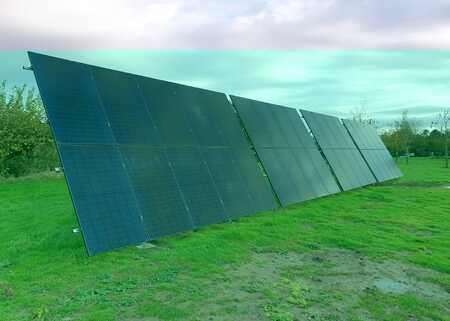Debunking 5 Ground Source Heat Pump Myths
Ground Source Heat Pumps (GSHPs) have increased in popularity over the last two decades, with 280, 000 households in the UK choosing this energy-efficient and environmentally-friendly heating and cooling solution since the year 2000.
Despite the clear benefits of installing a GSHP, there still remain certain misconceptions about this relatively new technology. Today we aim to debunk five common myths surrounding GSHPs, providing information that will help you make informed decisions about adopting this innovative heating and cooling system for your property.


Myth 1: high installation costs
One of the most prevalent myths about Ground Source Heat Pumps is the belief that their installation costs are exorbitant. While it's true that GSHP installations can require a higher initial investment compared to traditional heating systems, it's essential to consider the long-term financial benefits. GSHPs offer substantial energy savings over time, leading to lower utility bills and potentially offsetting the upfront costs.
Indeed, on average, a standard Ground Source Heat Pump can save the average 3-bedroom household in the UK up to £1500 on heating bills, depending on the system the pump replaces. What’s more, government incentives, tax credits, and rebates are often available to help alleviate the initial financial burden.
Myth 2: noise issues
Another misconception is that GSHPs are noisy and can be disruptive for a household or business. In reality, GSHPs are characterised by their quiet operation. The majority of the noise generated comes from the circulation pump and the compressor, both of which are housed in an insulated unit, minimising sound levels. With proper installation and maintenance, GSHPs can be just as quiet, if not quieter, than traditional HVAC systems.
Myth 3: inadequate energy efficiency
Some skeptics may doubt the energy efficiency of GSHPs, assuming that they might not deliver the promised savings. GSHPs, however, are renowned for their high energy efficiency. By utilising the constant temperature of the ground, they require less energy to heat or cool your property. This translates to lower energy consumption, reduced greenhouse gas emissions, and a smaller environmental footprint compared to conventional heating systems.
Myth 4: need for planning permission
Another misconception relates to the need for planning permission when installing a Ground Source Heat Pump. In many cases, GSHP installations do not require planning permission, as they typically fall under permitted development rights. It is advisable, however, to consult local regulations and guidelines to ensure compliance. Working with experienced professionals such as Evergreen Renewables, those familiar with local building codes, can simplify the process and address any potential concerns.
Myth 5: unsuitability for older properties
One common myth is that GSHPs are unsuitable for older properties compared to new builds. In fact, the flexible installation characteristics of a GSHP mean they can be adapted to various property types, including older homes. The overall heat demand of the property is calculated, and some remedial insulation work may be required.
A thorough survey and a reliable installer will prevent the incorrect technology being installed. The system's design and installation may require some adjustments to cater to the specific property's features, but GSHPs can provide efficient and reliable heating and cooling solutions regardless of the property's age.
How can we help?
As renewable energy solutions become increasingly important in the fight against climate change, Ground Source Heat Pumps offer a promising avenue for sustainable heating and cooling.
Embracing this technology can lead to long-term energy savings, reduced environmental impact, and enhanced comfort for your home or business. If you’d like to find out more about the benefits of installing a Ground Source Heat Pump on your property, please don’t hesitate to get in touch.
You might also be interested in...

Air Source Heat Pump and Heating System13/03/2020
A typical installation of an Air Source Heat Pump, Water Cylinder and Radiator Heating System.

Ground Source Heat Pump and Solar PV Project in Somerset23/11/2020
This client wanted to reduce the running costs of his family home, and reduce their carbon footprint by eliminating their reliance on heating oil.

The benefits of having solar panels ground mounted06/12/2022
Ground mounted, or roof mounted? Just one question to consider when looking to install solar panels on your property.

Do you need planning permission for electric vehicle charging points?08/09/2022
With ambitious government targets for the UK to reach net carbon zero by 2030, more and more people are looking into purchasing electric vehicles. But what are the planning rules when it comes to installikng EV charge points?
Posted on October 5th 2023

